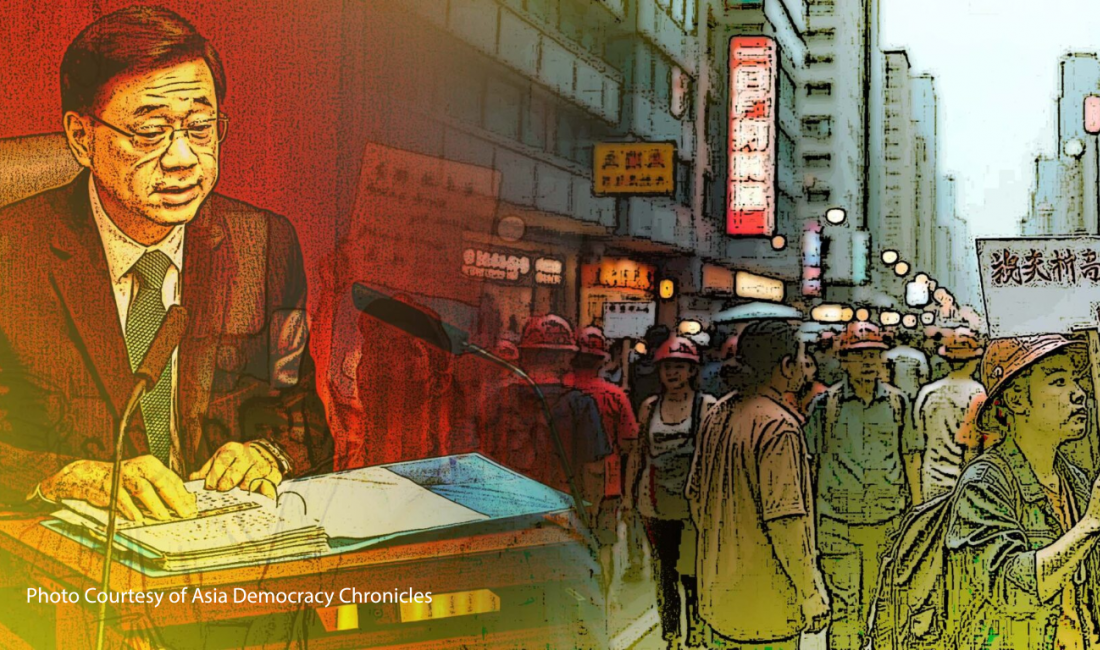Conforming Unions to Draconian Laws Erodes Local Liberties
This piece is republished from Asia Democracy Chronicles.
On Feb. 24, 2025, the government introduced amendments to the Trade Unions Ordinance to align union regulation with Hong Kong’s National Security Law 2020 and Safeguarding National Security Ordinance, otherwise known as Article 23.
The proposal will be tabled in the legislature in April.
Government officials, lawmakers, and the pro-Beijing Hong Kong Federation of Trade Union have expressed support for the proposed amendments.
Blacklisting union leaders
Under the proposed amendments, those convicted of national security offenses would be banned from leading or founding new unions.
Meanwhile, union officers charged with the same offense—but who have yet to be convicted—need to disclose the charge to the Registrar of Trade Unions—a body under the Labor Department which oversees the regulation and governance of unions. This is intended to avoid the shutting down of their unions. Such a requirement preemptively assumes guilt, which could then destabilize union governance by forcing democratically elected leaders to step down.
These actions resemble political blacklisting, which prevents individuals labeled as “security risks” from participating in civil society through unions and punishes dissent under the guise of “national security.”
Isolating trade unions
The proposed amendments would also restrict unions’ access to foreign funding, requiring government approval. Such restrictions isolate Hong Kong unions from global labor networks, weakening their ability to advocate at international levels.
It is important to note that the Trade Unions Ordinance and National Security Law share the same overly broad definition of “external force,” which includes foreign governments as well as political parties and organizations.
Even if trade unions were allowed to access foreign funds, unions cannot use such funds during local elections—including District Council, Legislative Council, and Chief Executive elections, thereby hindering a union’s right to equal participation in decision-making.
Hong Kong trade unions would also be prohibited from affiliating with any “political body” overseas. The vague definition of “foreign political organizations” could extend to non-governmental organizations and international union federations critical of Hong Kong and Chinese policies.
Blocking foreign links and labeling unionists as “security threats” are a form of discrimination against labor rights defenders.
Broad government control over unions
Under the proposed amendments, the Registrar of Trade Unions would gain broad investigative powers under the proposed amendments.
Even without a warrant, the Registrar could enter union premises to inspect, duplicate, and seize materials, while legally requiring unions to comply with investigations.
The Registrar could also deny new union registrations and mergers—with no right to appeal—on ambiguous “national security” grounds. The lack of independent review on denied registrations undermines the “adequate safeguards and effective remedies against abuse” that international law insists upon.
There would also be tighter government influence on union activities, including stricter control over procedural timelines for appeals and even restrictions on union names. Unions would be mandated to maintain records—such as financial accounts and membership lists—for government inspection.
All these could dissuade workers from organizing around sensitive issues, thereby undermining their freedoms of expression, peaceful assembly, and association.
Silencing dissent
By subjecting unions to stringent political vetting and surveillance, the proposed amendments could discourage the formation of new independent unions while also creating a hostile environment for the few existing ones.
This is not surprising in light of the recent pronouncement of the Hong Kong Secretary for Labor and Welfare, Chris Sun: that freedom of association is not absolute and therefore subject to restrictions.
Fearful of being accused of violating national security laws, unions might self-censor and avoid political advocacies. This undermines workers’ right to hold strikes and protests in support of broader sociopolitical causes.
Since the implementation of the National Security Law in 2020, more than 200 unions—many of which were formed during the 2019 protest movement—have disbanded under political pressure. The Hong Kong Information Technology Workers’ Union and the Student Front Union, for example, disbanded in 2021 due to safety concerns. In the same year, the Hong Kong Confederation of Trade Unions, the territory’s largest independent trade union, disbanded for the same reason.
Incompatibility with human rights standards
It cannot be stressed enough that the proposed amendments are overly broad and go beyond what is necessary or proportionate. This is alarming since restrictions on freedom of association must be strictly defined under international human rights laws including the International Covenant on Civil and Political Rights and the International Covenant on Economic, Social, and Cultural Rights.
The proposed amendments could deem any union action as “politically objectionable,” thereby potentially limiting legitimate union activities. This violates the International Labour Organization (ILO) Freedom of Association and Protection of the Right to Organize Conventions No. 87 and the Right to Organize and Collective Bargaining Convention No. 98, which allow unions to affiliate internationally and protect them from administrative dissolution.
International bodies, including the United Nations Human Rights Committee in its 2022 Concluding Observation on Hong Kong and the U.N. Committee on Economic, Social and Cultural Rights in its 2023 Concluding Observation on Hong Kong—have also raised concerns over Hong Kong’s National Security Law and its impact on unions, urging the government to amend or repeal such laws in compliance with international human rights standards.
Call to action
The Asian Forum for Human Rights and Development (FORUM-ASIA) is deeply concerned over the proposed changes. We call on the Hong Kong Government to withdraw the proposed amendments.
Authorities should engage in meaningful dialogue with trade unions and civil society to ensure that their country’s or territory’s labor laws uphold international human rights standards, including the right to form and join unions without fear of political persecution.



